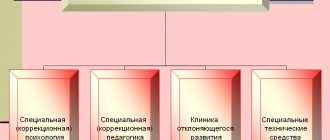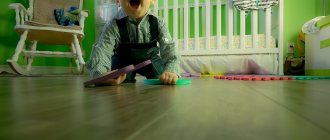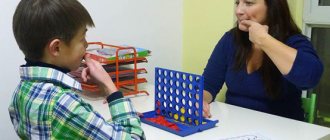A defectologist is a teacher who teaches children with special needs of psychophysical development. He conducts a comprehensive examination of the child’s personality, helps him develop communication skills, form correct pronunciation, and adapt to the society of peers and adults. Classes are aimed at developing sensory perception, attention, thinking, imagination, ability to concentrate, and control emotions. In addition, the defectologist advises parents on issues of special education of the child and communication with him. The lesson program is always compiled individually, taking into account the level of psychological and mental development of the child.
When should you contact a speech pathologist?
Signs of violations sometimes appear individually, sometimes in combination. In the first case, parents can attribute these phenomena to an age crisis, since many pathologies make themselves felt just at the age of 2.5-3 years. Therefore, parents of three-year-olds should be especially vigilant. We recommend urgently showing the child to a defectologist if:
- speech development lags behind the age norm, the child does not speak at all or has an extremely poor vocabulary, prefers gestures, facial expressions, “his own language”;
- the baby does not understand the speech of an adult (with normal hearing), cannot fulfill simple requests;
- the child seems to be “in his own world”, he avoids communication with peers and adults;
- does not like to communicate with other children, often plays alone, and the game consists of them and the same repeated actions;
- has difficulty coordinating movements, cannot perform actions that require precise movements;
- does not obey, throws tantrums for no apparent reason;
- poorly assimilates information, cannot establish cause-and-effect relationships, and thinks slowly.
It is extremely important not to waste time and contact a defectologist as soon as you notice at least one of the listed signs.
Why is it necessary to work with parents?
Now I have good contact with my parents. But at first they were quite wary of me. They have come a rather difficult path - from the moment of accepting the fact that the child is special, to the realization of the need to turn to a special teacher. They are usually very anxious and overprotective. It is difficult to explain to such parents that their child is not sick. He develops according to the same laws as other children, only with a delay. And you don’t have to fasten buttons and pour tea for him, otherwise he’ll never learn it. Society also does not always treat such parents correctly.
Parents don't always hear what I recommend. But I try to find my own approach to everyone, just like with children. I even get the feeling that the work is aimed more at parents than at students. They need to be supported, told about children. This is not difficult, because there are few students in the class and there is enough time to tell and explain everything to everyone. I try to notice every little thing, everything that the child has begun to do better. This is a great support for parents.
Parents have to work with the child more than I do. Our work is interconnected. But if only the teacher works, and the parents do not find an opportunity to study with the child, there will be no result. It is important that parents reinforce new skills at home. We have diaries where I write down all the tasks. And I definitely say separately that at home, please do not zip up, do not help get dressed if the child already knows how to do it himself.
How are classes with a defectologist?
Depending on the age of the child, classes have their own specifics. Let's tell you more about them.
From 1.5 to 3 years
Classes are aimed at teaching the child to communicate with adults, to play (play activity before entering school is the leading one), as well as to form sensory standards (color, shape, size), develop attention, memory, and thinking. With the help of special exercises and games, the defectologist develops auditory, tactile and visual perception.
From 3 to 5 years
Exercises and games are selected in such a way as to correct problematic behavior and create in the child a desire to explore the world around him. In addition, the defectologist teaches the child to navigate in space, perceive and correlate objects by color, size and shape, think logically, and concentrate on the task at hand. Particular attention is paid to the development of attention, memory, and the ability to analyze and synthesize information.
How can a defectologist help if a child has been seriously diagnosed?
Thanks to timely diagnosis and attentive attitude of parents, many serious disorders - mental retardation, autism and ASD, mental retardation can be identified early, at the age of 2.5-3 years. For such children and parents, the defectologist is the main teacher; it is he who builds an individual program of development, training and education, and socialization.
The child has mental retardation
Mental retardation is a disorder in which a number of higher mental functions (attention, thinking, emotional-volitional sphere, memory) mature later than expected by age. A defectologist has to solve several problems at once:
- development of attention, perception, speech, thinking, memory;
- teaching gaming activities;
- accumulation of sensory impressions;
- formation of knowledge about the surrounding world.
During classes, the teacher encourages the child’s creative activity by offering different options for tasks. As you progress, the learning material gradually becomes more complex.
The child has autism or ASD
The purpose of the classes is to compensate for deficiencies in the baby’s development that were identified during the examination. During diagnosis, the defectologist evaluates the following points:
- whether the child can imitate an adult and act according to verbal instructions;
- is he able to draw up an action plan and follow it;
- does he distinguish objects by color, shape, size;
- how developed are the motor and sensory areas;
- does the child confidently navigate in space, can he name and show parts of the body;
- how quickly the baby learns information, whether he can switch from one task to another, and whether he avoids participation;
- how the child behaves when communicating, how he reacts to the need to participate in the conversation.
As we have already said, exercises and games are selected to overcome identified developmental deficiencies. Classes with a speech pathologist are an important part of the correction program.
The child has mental retardation
Correctional training is carried out in several directions at once:
- development of the emotional-volitional sphere, attention, memory, imagination;
- development of all types of thinking;
- accumulation of knowledge about the world around us, replenishment of vocabulary, development of speech;
- sensorimotor development.
Classes with a defectologist are of an applied nature, that is, the child learns independence and masters communication skills with peers and adults.
Work of a speech pathologist teacher in a secondary school
Work of a speech pathologist teacher in a secondary school
In connection with the transition to new Standards and a qualitatively different paradigm of the educational process, the content of the professional activity of a specialist in an educational institution working with children with disabilities - a teacher-defectologist - is also undergoing changes.
The standard takes into account the educational needs of children with disabilities; it assumes the creation of special conditions in an educational institution for their learning and development, ensuring the correction and overcoming (complete or partial) of disorders in the child’s development.
The activities of a teacher-defectologist in a general education school are aimed at solving the problems of teaching and raising children whose difficulties are persistent and require prolonged observation and specialized assistance at different age stages (including situations where the child received long-term specialized assistance at an early age and preschool period).
The recipients of help from a speech pathologist are children with disabilities. The category of children with disabilities (CHD) currently includes children whose health condition prevents them from mastering educational programs of general education outside of special conditions of education and upbringing, i.e. These are disabled children or other children under the age of 18 who are not recognized as disabled children in the established order, but have temporary or permanent deviations in physical and (or) mental development and need to create special conditions for education and upbringing. Children with disabilities may have physical and (or) mental development disorders of different nature and severity, ranging from temporary and easily remediable difficulties to permanent deviations that require an individual education program adapted to their capabilities or the use of special educational programs.
Thus, we are talking about a wide range of students, some of whom have a developmental problem that can be solved by one specialist, for example, a speech therapist, while others require the help of a number of specialists to solve it, with special learning conditions and prolonged timing of correctional work. The main criterion for classifying a child into the group of children with disabilities is the presence of developmental deficiency(s), which determines the child’s special educational needs. The special educational needs characteristic of children with disabilities will differ in children of different categories, “since they are determined by the specifics of mental development disorders, which determine the special logic of constructing the educational process,” which should be reflected in the structure and content of education (N.N. Malofeev , E.L. Goncharova, O.S. Nikolskaya, O.I. Kukushkina).
Currently, a number of educational institutions are creating special conditions at their base that make it possible to provide variable forms of education to children with disabilities in accordance with their characteristics and the public’s request for educational services. Parents (legal representatives) are given the right to choose an educational institution available at their place of residence and the form of education. Inclusive practices and integrated education are becoming widespread, providing an opportunity for the successful appropriation of cultural experience by each child, taking into account his age characteristics, internal resources, health status and individual capabilities.
Integration processes involve a variety of variable forms of inclusion of children with disabilities among their peers.
In general education schools, the following types and forms of integration of children with disabilities are provided, identified on the basis of existing developments in scientific, theoretical and practical terms (L.M. Shipitsyna, N.N. Malofeev, N.D. Shmatko, E.A. Ekzhanova, etc.).
In appearance it is educational (pedagogical) and social integration.
Social integration presupposes the social adaptation of a child with disabilities into the general system of social relations and interactions, primarily within the framework of the educational environment into which he is integrated. Pedagogical (educational) integration is the formation in children with disabilities of the ability to master educational material determined by the general education program, that is, the general curriculum.
Based on modern scientific and methodological developments of the IKP RAO (N.N. Malofeev, N.D. Shmatko N.D., 2008, etc.) and the innovative experience of integration educational institutions, the following variable forms of integrated education of students within a comprehensive school should be highlighted. The forms presented below are determined in accordance with the general level of readiness of the child for socio-educational integration: permanent, combined, partial, temporary.
Full integration - this form of integration is used for children who, in a compensatory preschool educational institution or other specialized conditions (special groups in a combined preschool educational institution, variable forms of preschool education, attending correctional classes in primary care centers) have reached the level of psychophysical development of the age norm. In this form, children with disabilities are taught in general education classes on a general basis and, if necessary, receive assistance from specialists.
Partial integration - this form of integration is used for children experiencing persistent learning difficulties and receiving education in a special (correctional) class or compensatory education class. With this form of integration, students are included in a single educational space with normally developing schoolchildren; they are involved in all school-wide educational and training activities on an equal basis with students in general education classes. This form is also used for children in individual education, who can attend separate lessons in the class together with the main group of students.
Temporary integration - this form of integration is used for children who are home-schooled, in which students with disabilities have the opportunity to socially communicate with healthy peers (participation in extracurricular educational activities, in general school activities).
Combined integration - this form of integration is considered as the inclusion of a child with disabilities in a general education class, providing him with qualified assistance from specialists and creating specialized learning conditions in accordance with his characteristics. With this form of integration, the educational process of a child with disabilities is individualized in accordance with his special educational needs. Currently, this form of integration is more often considered as inclusion.
A special education teacher accompanies students with disabilities who are integrated into the general education school environment and who have special educational needs due to the severity of the main disorder and which impede the favorable course of adaptation and learning processes. Practice shows that the specialist focuses on children with disabilities studying in a special class (partial integration) and those in a combined form of integration.
The purpose of the specialist’s activity is to provide timely specialized assistance
for students with disabilities who have learning difficulties in mastering the mandatory minimum content of education in a public school setting. The correctional pedagogical work of a defectologist, based on the principles of correctional pedagogy, is built taking into account the age and individual characteristics of students, in accordance with the structure and nature of the disorders, their impact on educational activities and the overall development of the child.
A teacher-defectologist in his work is based on a differentiated approach within the category of children with disabilities in order to determine individually oriented methods of correctional work. At the same time, the very content of the specialist’s correctional pedagogical work is built on the basis of an integrated approach, which, first of all, involves ensuring interaction between participants implementing the correctional program of work with the child. Thus, a teacher-defectologist, through recommendations and consultations, includes parents, teachers, and, if necessary, the administration in the process of correctional education. The interaction of the defectologist with other specialists is mandatory, which is carried out within the framework of the school psychological, medical and pedagogical consultation.
This approach also provides for the implementation of a set of measures to ensure the effective conduct of individual and group classes. A teacher-defectologist not only conducts correctional classes, but also provides holistic correctional pedagogical (defectological) support in the form of observation of the education and upbringing of each student in need, which includes dynamic observation of the child’s development and assimilation of knowledge in accordance with the mandatory minimum content of education, advisory work with parents and teachers. Correctional pedagogical support is also necessary for those students in special (correctional) classes who do not need systematic lessons from a defectologist.
The content of the specialist’s correctional work depends on the population of children with disabilities, the specifics of their disorders and developmental characteristics. With children with visual impairments, the following main directions of correctional work are traditionally identified, implemented by a teacher-defectologist (typhlopedagogue): visual perception, social and everyday orientation, sensorimotor development, spatial orientation.
With children with hearing impairment, the following main areas of correctional work are traditionally identified, implemented by a teacher-defectologist (teacher of the deaf): auditory-speech development, development of pronunciation skills, development of communicative function, emotional and social development and the formation of life competence.
The main activity of a specialist in a comprehensive school is aimed at children with mental retardation (MDD), who continue to experience difficulties in mastering educational knowledge, skills, and abilities in special educational conditions, including in correctional classes. As a rule, these are children with mental retardation of cerebral-organic origin (according to the classification of K.S. Lebedinskaya), which is caused by organic damage to the central nervous system in the early stages of ontogenesis, which negatively affects the overall development of the child, his intellectual activity and is characterized by limited possibilities for compensating for the disorder .
According to scientific research, children with mental retardation of cerebral-organic origin (COG) are characterized by significant heterogeneity and polymorphism within the category itself. The existing partial disorders of the central nervous system are combined with the relative preservation of others, which determines individual differences and features of the structure of the disorder. To qualify the difficulties of students with mental retardation of the central nervous system, a detailed analysis of development is necessary, not only taking into account the identification of pathogenic factors, preserved and impaired functions, primary and secondary developmental disorders, but also determining their mutual influence in the overall picture of the child’s development. Therefore, children in this category always require comprehensive assistance with varying degrees of participation from specialists in various fields.
This manual examines the work of a speech pathologist teacher working with children with learning difficulties, and the assistance of a typhoid teacher and a teacher of the deaf is requested as necessary as additional services from external specialists
The content of the activity of a teacher-defectologist is implemented in the following areas of work:
, providing an integrated approach to its organization: diagnostic, correctional, analytical, advisory, educational and preventive, organizational and methodological. In addition to traditional areas of work, analytical ones are additionally highlighted, which determines the interaction of specialists in work, and also allows you to adjust lesson programs in accordance with the achievements of students.
Each of the areas in the specialist’s work has its own characteristics that ensure the satisfaction of the special educational needs of the category of students in question.
Diagnostic direction.
The diagnostic work of a special teacher is an integral part of a comprehensive study of the child by school PMPK specialists. The results of the defectological examination are necessarily compared with psychological, medical, and pedagogical data and discussed at council meetings. The diagnostic line of work includes: primary defectological examination; systematic stage-by-stage observations of a specialist over the dynamics and correction of mental development; checking the compliance of the chosen program, methods and techniques of teaching with the real achievements and level of development of the child.
The main task
This direction is a forecast of possible learning difficulties at its initial stage, determination of the causes and mechanisms of educational problems that have already arisen. Therefore, in the examination of children with disabilities by a speech pathologist, two aspects are distinguished: psychological and pedagogical. At the same time, the psychological aspect is the basis for qualifying a child’s school difficulties and determining whether the level of current development corresponds to his educational achievements. It includes the study of the level of mental, speech and motor development of the student, the characteristics of gnosis and praxis, inter-analyzer interaction, spatio-temporal concepts, and the nature of the student’s voluntary activity.
The purpose of the pedagogical examination is to identify difficulties in the formation of knowledge, skills, and abilities, to determine the stage at which these difficulties arose, and the conditions for overcoming them. To do this, a study of the level of mental development of the child is carried out, analysis of written work (qualitative characteristics of errors), observation of students in educational frontal activities and, if necessary, additional study of the development of school skills and abilities.
The diagnostic activity of a specialist can solve various problems. In this regard, the following stand out:
Primary diagnosis
students with disabilities. Its goal is to determine the level of actual and “zone of proximal development” of the child, the causes and mechanisms of learning difficulties, and identify children in need of specialized help. The diagnostic study is carried out during September (tentative dates are September 1-15). Based on its results, the following occurs: the distribution of children into groups according to the leading disorder, the determination of optimal conditions for individual development, and the enrollment of students in individual or group classes. The defectologist draws up an examination protocol and a defectological presentation for the student.
Dynamic learning
students. It is carried out with the aim of tracking the dynamics of the child’s development, determining the correspondence of the selected forms, techniques, and teaching methods to the student’s development level. In the process of dynamic study, the problem of differentiating similar conditions of developmental disorders and identifying children who are not subject to education in a comprehensive school, even in an integrated form of education, are also solved. Dynamic study is carried out at least twice a year (September-October - May). The results are discussed at a meeting of the school PMPk and are formalized in the form of a defectological presentation for the student. Dynamic study also includes a comparison of the results of students’ development with the results of educational success in subjects, therefore it contains an analysis of tests and current work of students, determination of the formation of educational skills and methods of educational work (skills and skills of perceiving information, planning educational activities, self-control, etc.)
Staged diagnostics.
This type of diagnosis is necessary to ascertain the effectiveness and determine the effectiveness of corrective influence on the development of educational and cognitive activity of children attending classes with a defectologist. The results of the specialist’s stage-by-stage conclusions are reflected in the Child’s Dynamic Development Card.
Current diagnostics
. The diagnostics is aimed at examining students in mass school classes at the request of parents, teachers, and school council specialists. This stage has no time frame; the examination is carried out throughout the academic year as needed.
Corrective direction.
The correctional direction of work of a teacher-defectologist is a system of corrective influence on the educational and cognitive activity of a child with mental retardation in the dynamics of the educational process. Depending on the structure of the defect and the degree of its severity, the content of the correction work is determined.
The main form of organization of defectological work is group and individual classes. Children with a homogeneous disorder structure are enrolled in groups. The number of children in groups varies depending on the severity of the disorder (from 2 to 6 people). Group classes are held during school hours, taking into account the school's operating hours. Classes are correctional, developmental and subject-oriented. The frequency and duration of classes depends on the severity and nature of the disorder, and the total load on the child is determined taking into account the work of other specialists with him. Topics of group and individual lessons, as well as attendance records, are reflected in the standard class register.
To the main directions
correctional and developmental work include:
sensory and sensorimotor development;
formation of spatio-temporal relations;
mental development (motivational, operational and regulatory components; formation of age-appropriate general intellectual skills, development of visual and verbal forms of thinking);
formation of universal educational actions, normalization of leading age activities;
formation of diverse ideas about objects and phenomena of the surrounding reality, enrichment of vocabulary, development of coherent speech;
readiness to perceive educational material;
formation of skills and abilities necessary for mastering program material.
Based on the child’s characteristics, the defectologist’s priority area of work with him (one or more) is identified, which serves as the basis for building a correction program.
A special feature of conducting correctional classes is the use of special techniques and methods by the defectologist to ensure the satisfaction of the special educational needs of children with mental retardation, providing students with dosed assistance, which allows the correctional process to be individualized as much as possible. An important result of the classes is the transfer of the skills and abilities developed during them into the child’s educational work, therefore, it is necessary to link the specialist’s correctional programs with the program educational material.
The main time in the correctional work of a teacher-defectologist is allocated to classes with children of primary school age. However, classes can also be conducted with students in grades 5–9 - with those schoolchildren who have already attended classes with a defectologist, but due to the persistence of the disorder (a pronounced form of mental retardation of cerebral-organic origin) need continued correctional work. Preference in correctional work is given to the formation of methods of mental activity and methods of educational work of students based on the material of various academic disciplines. We are talking about the formation of “broad” techniques that are used in the lesson regardless of the field of knowledge and are interdisciplinary in nature. These include techniques such as examining an object from different points of view, logical processing of text, highlighting the main meaning of the context, concise retelling, etc.
Analytical direction.
Analytical direction - involves analyzing the process of corrective influence on the development of a student and assessing its effectiveness, as well as analyzing and assessing the interaction of specialists.
The need for this area of activity of a defectologist is due to the need for an integrated approach to solving a child’s problems, which involves:
1) a systematic analysis of the personal and cognitive development of the child, which allows not only to identify individual manifestations of mental development disorders of the student, but also to determine the causes of the violation, to trace their relationship and mutual influence on each other;
2) creation of comprehensive individual correctional and developmental programs aimed at the interconnected development and correction of various aspects of the child’s personal and cognitive development;
3) providing specialized support for the training and education of students. Depending on the underlying developmental disorder, each child may be supervised by one or another specialist who ensures the interaction of those specialists whose help the child needs;
4) prevention of student overload. Corrective work of specialists should be planned taking into account the total load on the student;
5) interaction of specialists within the school psychological-medical-pedagogical council.
Thus, this direction ensures interdisciplinary interaction between specialists, allows us to evaluate the effectiveness of correctional interventions and adjust correctional training programs in accordance with the child’s achievements. For this purpose, a comprehensive dynamic examination of children is carried out (September-October - April-May). The results are discussed at school PMP meetings. Based on the results of the consultation, the correctional work of the defectologist with students with disabilities is adjusted, and comprehensive recommendations are drawn up for parents and teachers.
Advisory - educational and preventive direction.
This direction involves providing assistance to teachers and parents of students in matters of raising and educating a child, preparing and involving parents in solving correctional and educational problems, as well as working on the prevention of secondary and tertiary developmental disorders.
The teacher-defectologist develops recommendations for parents and teachers in accordance with the age and individual-typical characteristics of children, the state of their somatic and mental health; At the request of parents and teachers, additional examinations of students are organized, individual consultations and thematic parent meetings are held, and speeches are held at methodological associations of teachers.
The recommendations developed by the specialist are specific and general in nature. Thus, for working with individual students, recommendations are drawn up that allow the teacher to take into account their individual characteristics in front-line work in the classroom. In other cases, the recommendations are general. Such recommendations should be preceded by a speech by the defectologist at a meeting or methodological association, in which he explains in more detail to parents or teachers the features of any developmental disorder.
Organizational and methodological direction.
This area of activity of a teacher-defectologist includes preparation for consultations, meetings of methodological associations, pedagogical councils, participation in these events, as well as preparation of documentation, organization of examination of individual students at the PMPK of the city, district for the removal of needy students to special (correctional) institutions.
When preparing a consultation, a special teacher draws up a defectological presentation for each student, which contains the main diagnostically significant characteristics of the child’s developmental characteristics for qualifying his disorder.
The correctional work of a teacher-defectologist is based on programs for general education institutions, using correctional techniques for each area of work.
The child has Down syndrome
The main goal of the classes is to prepare the child for social adaptation, teach important work skills, and form the correct forms of behavior in him. These results can only be achieved with an integrated approach and early diagnosis of the disorder:
- development of memory, thinking, speech, attention;
- encouraging the pursuit of knowledge;
- development of sensory perception;
- taking into account interests and zones of proximal development.
The classes use simple material that is accessible to the child, and it is repeated as many times as necessary to fully assimilate it.
The most important condition for successful correction of developmental disorders is early diagnosis . If your child is 2.5-3 years old, take a closer look at him. If you find any warning signs, contact a speech pathologist as soon as possible.
Publication date: 04/19/2021. Last modified: 11/25/2021.
"It became easier"
A ten-year-old disabled child with SMDD was admitted to school. I had not visited child care institutions before. He has severe intellectual and other developmental disabilities. Initial communication skills have not been formed, does not speak, behavior is inadequate, does not understand instructions and drawings, and many elementary concepts have not been formed.
A school schedule convenient for the child was agreed with the parents. Classes were conducted individually with a high degree of involvement of the mother. Almost every lesson for a speech pathologist is open. The individual form of classes allows you to select effective approaches, take into account as much as possible the characteristics of students with SMDD, and create a situation of success for each child. This increases their motivation to learn and cognitive activity.
After six months of correctional and developmental classes and home exercises, positive development dynamics appeared. During the next examination, the neurologist remarked: “What’s wrong with the child? A meaningful look and normal behavior appeared.” A year later, the student began to speak, work with simple cards, and follow instructions.
Mom about the result of classes with a speech pathologist: “It has become easier at home and in public places, now you can go to the store with him.”
Among the children and adults around him at school, at the beginning, there was fear and misunderstanding. Now relations have changed to tolerant and friendly. They communicate with the child and shake hands.
Examples of working methods
The educational process is based on the characteristics of the disorder. For example, with hearing problems, oral speech decays. This is especially true for preschool age, since during this period there is an active formation of speech.
Hearing loss and lack of normal communication lead to the baby becoming silent. In the absence of proper correctional support, he loses the skill forever. Later he is taught sign language, but this greatly limits his ability to integrate into society.
Adaptation to real life is what a defectologist does in kindergarten and school. The teacher of the deaf focuses on the development of oral speech. The typhlopedagogue has to teach in a slightly different way. Its main task is the development of social and everyday skills. It is important to teach ideas about the world around us, to teach students to perceive the world “through their fingers.”
For this purpose, special voluminous books are created. They are made of different materials and depict: buildings, streets, animals, plants. All this allows students with visual impairments to form ideas about the world around them.
It is important to instill self-care skills, since sometimes parents do not allow their child to do this, depriving him of the chance for an independent life. Closer to school, preparation for mastering Braille begins. This is a raised dot pattern, which is analogous to regular writing. The blind perceive it through their fingers and read what is written.
Oligophrenopedagogues work with children with intellectual disabilities. This is mental retardation and mental retardation. Working with such students is based on the development of thinking. They are also taught self-service and communication skills. Children with mild mental retardation are taught to work.
What diseases does a speech therapist treat?
The following types of diseases that can be eliminated by a speech therapist include:
- aphonia, dysphonia (impaired speech sonority);
- dyslalia (impaired pronunciation of separately considered sounds: lisp, burr);
- logoneurosis (speech disorder in the form of stuttering);
- tachylalia, bradyllalia (impairments manifested in the speed of pronunciation);
- dyslexia (speech impairment manifested in reading skills);
- rhinolalia (that is, nasal sound);
- various speech disorders that occurred in patients due to deafness;
- disorders associated with hearing or pronunciation that arose as a result of the patient undergoing surgery or any injury.
Defectologist: where can he work?
The main place of work of a defectologist is a specialized school institution. Also, such professionals are needed in medical and children's centers, boarding schools, and specialized sanatoriums. Increasingly, experts in the field of defectology are invited to work in private kindergartens and schools.
Increasingly, defectologists are inclined to conduct private practice. It is enough to open an office to receive visitors to start working on your profile. The difficulties in this case are associated only with finding clients. True, thanks to the development of social networks, today anyone can start advertising their services with minimal investment.
Example of a resume Example of a resume (page 2)
Speech therapist and defectologist: what are the main differences
The main differences between a defectologist and a speech therapist are as follows:
- The target audience. A defectologist works with special children who have certain deviations in mental and physical development, and a speech therapist works with absolutely developed children who have problems with speech and pronunciation.
- Purpose of the lesson. A defectologist in a school or kindergarten strives to help the child learn to express his thoughts, restores gaps in knowledge, and applies measures to correct mental development. A speech therapist works only on the development of the speech apparatus and speech correction.
- Restrictions on the age category of children. A defectology specialist can conduct classes with very young children (starting from 1 year), but there is no need to rush into classes with a speech therapist until the child is three years old. In addition, an adult can also consult a speech therapist.
- A defectologist is a wide-profile specialist, something that a speech therapist, whose field of activity is much smaller, cannot boast of.
How to become a speech pathologist
In order to start working in this specialty, you need to obtain a specialized higher or secondary education. Pedagogical universities and colleges have a defectology department where you can study to become a special education teacher.
The program must include the following disciplines:
- anatomical, physiological and clinical foundations of defectology;
- general, developmental, special pedagogy and psychology;
- speech practices;
- regulatory and legal framework of professional activity;
- genetics;
- psychological and pedagogical diagnostics of persons with disabilities.
In addition to the above, future defectologists receive detailed skills in raising and teaching children with various special needs, and many other subjects are also present. The exact list of disciplines studied depends on the chosen institution.
People who have specialized psychological or pedagogical education can retrain as a defectologist. In this case, training will take only a few months instead of 4-5 years.
Necessary qualities of a specialist
To successfully perform his work, a defectologist must be able to easily establish contact with children and maintain a comfortable atmosphere for them during classes, and have the skills to teach writing and reading using non-standard methods.
In addition to professional knowledge, the personal qualities of a specialist are important. This job is suitable for people who:
- have organizational skills;
- are able to make decisions quickly;
- attentive and patient;
- psychologically stable;
- love both preschool children and teenagers;
- can be strict when necessary;
- sociable;
- are not indifferent to other people's problems.
In addition, the teacher must have competent speech, clear diction and a good memory. Intuitive abilities are also important. They will be useful for selecting the appropriate technique.
Who is the specialty contraindicated for?
This specialty has some medical restrictions. It will not be possible to become a defectologist for people suffering from:
- visual, hearing or speech impairments;
- mental disorders;
- diseases of the central nervous system;
- convulsions or loss of consciousness;
- problems with the vestibular system or cardiovascular system.
In addition, in accordance with the labor code, persons who have a criminal record or have been subject to criminal prosecution are not allowed to work with children.
Working conditions
The work is quite difficult; a defectologist spends his entire day under conditions of high neuropsychic, emotional, intellectual and communicative stress. In addition, the correctional teacher is on his feet almost all the time.
The salary of a defectologist is small. In Moscow, a specialist’s work is paid in the amount of 22-100 thousand rubles; for the regions the amount is more modest, almost 2 times less.
However, talented specialists have career prospects. The most experienced and successful teachers can receive an academic degree and the position of director.
Workplace
Defectologists are employed in both public and private institutions. This can be almost any establishment where there are children, for example:
- schools;
- orphanages, kindergartens and boarding schools;
- medical and rehabilitation centers;
- sanatoriums.
Often speech pathologists with extensive experience give private lessons. Classes in this format can be held with one or several children at once.
Pros and cons of the profession
Like most other specialties, the profession of a special education teacher has its advantages and disadvantages.
The advantages include:
- helping other people;
- work with children;
- demand for the specialty;
- opportunity for career growth;
- the versatility of defectology as a science.
An important and necessary profession for society. Despite the many positive aspects, there are also some negative aspects. The disadvantages of being a defectologist are as follows:
- constant psycho-emotional stress;
- success of work depends not only on the specialist, but also on parents, teachers and doctors;
- low salary;
- many job responsibilities;
- daily communication with people;
- the possibility of conflict with parents or children.
In addition, the specialist must constantly study defectology. Attending seminars, webinars and reading professional literature is an integral part of the life of a successful specialist.






